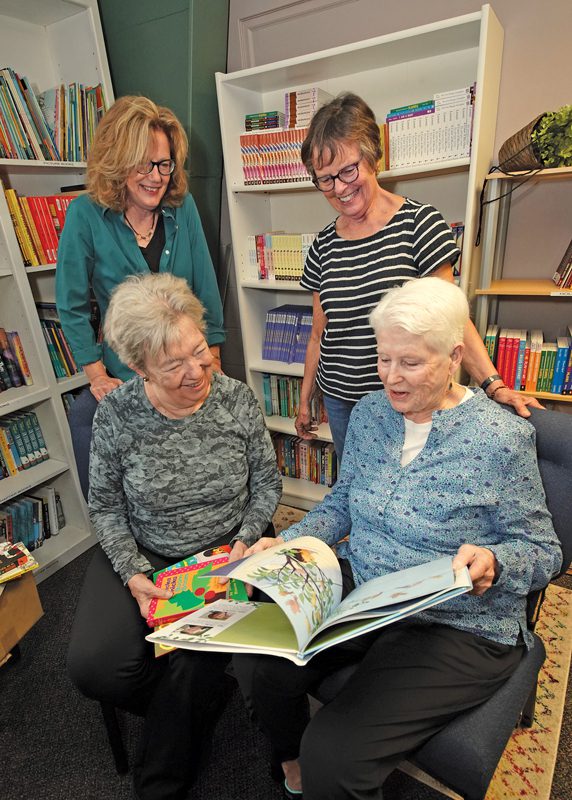
Clockwise from upper left: Deb Pilutti, Ann Furtwangler, Jan Brimacombe, and Marsha Chamberlin look over some of the children’s books that imprisoned parents can read aloud to their children thanks to recordings made by Staying in Closer Touch volunteers. | Photo by J. Adrian Wylie
The connection she’s seeing is between incarcerated people and their children. As a volunteer and board member at large with a nonprofit called Staying in Closer Touch, she records women in the Huron Valley Correctional Facility reading children’s books aloud. Those waiting their turn use markers and crayons to create cards for their child or grandchild. Pilutti says it’s “very powerful to witness.”
SICT began thirty years ago as part of what was then the Baby Book Club and is now the Children’s Literacy Network. Pilutti, herself a children’s author and illustrator, first heard about it eight years ago at what was then the Kerrytown Bookfest (it’s now the Ann Arbor Community Bookfest). Selling her book Ten Rules of Being a Superhero at a table for the Society of Children’s Book Writers and Illustrators, she met Anne Rueter.
Rueter, a veteran Ann Arbor journalist who died in 2021, was a SICT volunteer and told her about their work. “I’ve always been interested in the imprisoned and social justice issues,” Pilutti says. “And to connect that with children’s literacy—it seemed like a really wonderful organization.”
Related: The Children’s Literacy Network
Board president Marsha Chamberlin says they always ask participants, ‘Is this your first time coming to the program?’” When one woman at the Huron Valley Correctional Facility said it was, Chamberlin asked, “‘How old is the child you’ll be reading to today?’ She said, ‘Three weeks.’”
The woman had been separated from her daughter soon after giving birth. “I want my baby to recognize my voice,” she told Chamberlin, a jeweler and retired Ann Arbor Art Center CEO. “‘If I can read to her while I’m in here then when I go home, I’ll have already at least a little bit of a bond.’
“That practically brought me to tears,” Chamberlin says.
“A lot of times, especially with younger children, it can feel really jarring to be separated from a parent,” says another volunteer who asked not to be named. One man “told me about how his daughter [who] had been really struggling and wasn’t eating, was crying all the time, really wasn’t handling the separation well. After she received one of the books and heard his voice again, she just kind of came back to herself in a way that she hadn’t been since they’d been separated.”
The volunteers go to the women’s prison once a week. At any given time, Chamberlin says, they’ll “have 100–150 books, from baby cardboard books to chapter books for teenagers and everything in between.”
When the recordings are done, other volunteers transfer them to a secure location online. They print out a QR code that’s a link to the recording, which “is glued into the book,” Chamberlin says. When the book and card are delivered, “the kid can pick up the book and use a smartphone or whatever to hear their mom read the book.”
Prisons suspended in-person visits during the pandemic, but the volunteers went back into the women’s prison in March 2023. “The jail also wanted us to come back in, but it took a while for them to get going, so we’ve only been going into the jail for about six months,” says Chamberlin. They go twice a week and see both women and men. “In the former days we went to Milan federal prison, and we had a pretty big program out there—lots of participants.” But so far, “Milan has not let us back in. We don’t know why.”
Are certain authors or books especially popular?
“We have had multiple parents choose [Arnold Lobel’s] Frog and Toad books, which was very nostalgic for me,” says the anonymous volunteer. Another is Alan Zweibel’s Our Tree Named Steve. “It kind of centers around a family’s love of this tree. And honestly, that feels very emblematic of living in this area and this community, too.”
Pilutti was pleased when she “heard someone read my book The Dinosaur in the Garden.” But, she says, “What I enjoyed more was hearing a mother read to her child a friend of mine’s book, called Arnie the Doughnut by Laurie Keller. She read it—it’s a really funny book to begin with—with such enthusiasm. Everyone in the [activities] room was listening and laughing—quietly.
“You just knew that that kid was going to be in for a treat when she listened to that recording.”
Related: The Piluttis